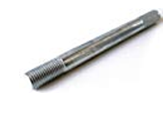briwy
Super Poster
VIP Member
150 PSI torque setting for alloy wheels.
Dunno where you got that from but the correct setting us 180Nm. psi is pressure not torque.
The torque setting is important. If it's too much then it will distort the steel inserts in alloy wheels leading to problems. If too low its possible the bolts can come loose.


















